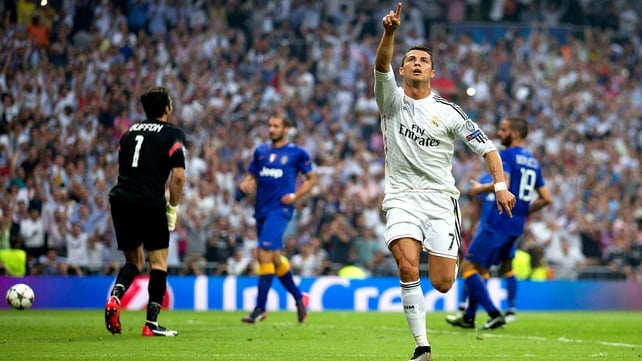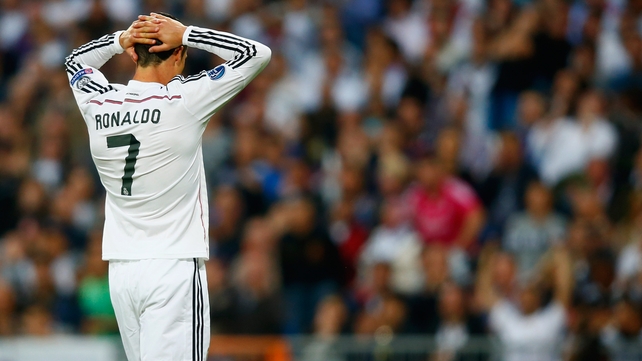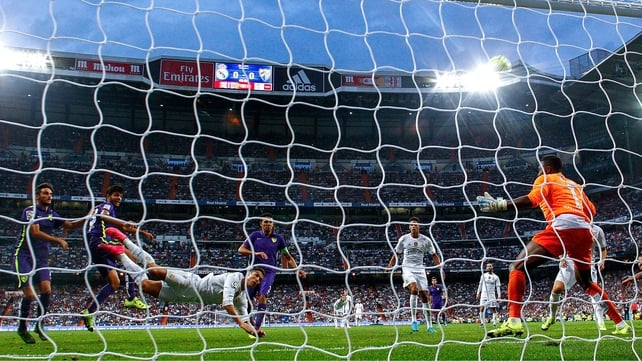There’s something not right with Cristiano Ronaldo, which is troubling news for his club Real Madrid ahead of Saturday’s clásico against Barcelona. Since joining the Madrid giants in 2009, he has scored an incredible 233 goals in 211 games.
His form, however, is dipping. He has failed to score in 12 of 18 games for club and country this season. In his last Champions League game against Paris Saint-Germain, he failed to get a touch of the ball inside PSG’s box.
"Florentino Pérez collects football players. He doesn’t sell his jewels" - Michael Robinson
Ronaldo is playing with a frown on his face. Real Madrid’s new coach Rafa Benítez has moved him out of position to accommodate the president’s favourite, Gareth Bale. Instead of drifting in from the left wing to poach goals, Ronaldo has been forced to play in a number nine role, with his back to goal.
He knows he has his suitors. They include his former club Manchester United, whose top brass felt they had done enough to secure a deal for him back in 2013, but it fell through at the last hurdle.
He has been flirting openly with PSG, who have tabled a €125 million bid for him. He was caught on camera, for example, whispering into PSG manager Laurent Blanc’s ear during their clubs’ match in early November: “I would love to work with you,” according to L’Équipe’s code-breakers.

It seems inconceivable that Real Madrid would sell him, however. His buy-out clause is set at €1 billion. The figure is set prohibitively high, but nothing in the world of football transfers is un-doable.
“It would be unthinkable for Real Madrid to sell Cristiano Ronaldo,” says Michael Robinson, presenter of an award-winning sports programme on Spanish television, Informe Robinson, and a Republic of Ireland international striker in the 1980s.
“Real Madrid’s president, Florentino Pérez, collects football players. He doesn’t sell his jewels. Ronaldo is an object of desire. Whether Real Madrid fans personally like him or not, they perceive him to be the Golden Ball, the best player in the world – the best player in the world has to play for Real Madrid, and it’s impossible to have Messi.
“Bear in mind, Real Madrid is a club whereby presidents get voted in, and get voted out by election. There are 90,000-odd members. The job of the president of Real Madrid is to serve them. For example, Roman Abramovich can do what he wants, or any other sheikh or owner of a football club. They don’t have to be popular. If Pérez were to sell Ronaldo, it might debilitate his team, but also lose him votes.”
"It is very difficult for Bale. If Ronaldo were not at the club it would be much easier for him." - Ramón Calderón
The irony is that Pérez almost didn’t buy Ronaldo. Real Madrid began their hunt for Ronaldo during his predecessor Ramón Calderón’s tenure as president. Calderón secured agreement with Ronaldo that he would move to Real Madrid in 2008.
Before the player signed a contract, though, Manchester United’s manager Alex Ferguson managed to convince him to stay in England for another year. Real Madrid were playing a friendly match in Bogotá, Colombia when news of the postponed deal filtered through to Calderón.
“I got up in the morning to receive a phone call from Real Madrid telling me, ‘You know what? Cristiano has announced that he’s extended his contract.’ I said, ‘It can’t be.’ Fifteen or 20 minutes later, I got a phone call from Cristiano, saying ‘Mr President, I’m so sorry. I have to do this because I’m quite happy with the club. Ferguson is like a father for me. I’m in love with the fans, everything here, but we have an agreement I will go next year.’
“I said, ‘Of course, it’s up to you.’ So we arranged everything for the next year. We got all the documents done. He signed an agreement for £80 million to leave Manchester United the following June. Everything was done by 12 December 2008.”
Calderón left office a month after the deal was inked. Pérez returned for his Second Coming as president in June 2009, but baulked at signing Ronaldo even though there was a £30 million penalty clause in the contract in case any party withdrew from the deal.

“The problem,” says Calderón, “was that when Florentino came, he said, ‘This is not a player for Real Madrid.’ He didn’t like to receive inheritances that he couldn’t be proud of in the future. He thought this player is not mine. I’m not going to take advantage of this. He said: ‘I think I can have two or three players for the same money. I don’t see Cristiano Ronaldo playing at Real Madrid.’
“The player knew that. He got very angry. Also his agent, Jorge Mendes, said, ‘OK, we’re going to leave. We are not going to claim the penalty clause.’ But then Real Madrid’s general manager, Jorge Valdano, convinced the president not to do something so silly: ‘Are we going to miss getting the best player of the world because of your pride or arrogance?’ So Florentino calmed down, and that’s why Cristiano wasn’t happy the first two or three years at Real Madrid.”
Ronaldo suffers for being an ugly stepchild in the eyes of Pérez, unlike his other galáctico signings like, say, James Rodríguez or Karim Benzema. Pérez indulges these players. They’re his adopted sons. He took time out of his business schedule to fly to Benzema’s house in Lyon to coax him into joining Real Madrid.
There is none who is indulged more than Gareth Bale. According to Diego Torres, a journalist with El País, Real Madrid would sell Ronaldo before his younger, buccaneering Welsh teammate.
“Florentino doesn’t like Cristiano,” says Torres. “He didn’t buy him. Florentino dreamed of Bale as a golden boot, scoring spectacular goals. His dream is to switch Cristiano with Bale because he created Bale as a superstar. He made the first €100 million player. He feels Bale is his creation, that everyone relates Bale to him, to Florentino.
“Florentino keeps saying Bale should become the next Ronaldo, the next megastar, the next flagship of the club, but it’s very difficult for Bale. If Ronaldo were not at the club it would be much easier for him.”

Ronaldo has never been a crowd favourite at Real Madrid. In March, during a minor blip in form, he was whistled at while playing a La Liga match at home against Levante. In the same month, a poll conducted by AS, one of Spain’s daily sports newspapers, found 32% of respondents believed he should be dropped from the team. At the time, he had scored 31 goals in 25 league matches.
They despise his narcissism. The bare-chested He-Man pose he broke into after scoring a penalty against Altético de Madrid in the 2014 Champions League final, for example, grated. The traditional Madridista is disgusted by those kinds of gestures of superiority or the fact, for instance, that he rarely celebrates his team-mates’ goals. He only celebrates his own goals.
"The age will pass a bill to Cristiano" - Miguel Ángel Linares
“If Real Madrid wins and he doesn’t score a goal, he’s sad,” says Juanma Trueba, deputy editor of AS. “He has an infantile ambition that doesn’t allow him to see that the benefit is for the whole team. He’s like a 10-year-old. He wants all the cake to himself and he doesn’t understand that he has to share.”
Time is catching up with Ronaldo. He will turn 31 in February. He covers less ground, and forages for his goals 20 metres further up the field than when he first arrived in Madrid. He has been troubled by a persistent knee injury, which caused him to limp out of last year’s World Cup.
“He’s tired. The play of Cristiano is fundamentally physical. He’s not like Messi. He’s a beast, a machine. The age will pass a bill to Cristiano,” says Miguel Ángel Linares, author of a book on the rivalry between Real Madrid and Barcelona entitled Madrid-Barça: ¡Es La Guerra!
Ronaldo is not Real Madrid’s first icon. Others such as Di Stéfano, Emilio Butragueño in the 1980s and Raúl, whose goal-scoring record at Real Madrid he surpassed in October, have come and gone. Significantly, none of them finished their playing careers at the club.
Sport is a brutal marketplace that way. Real Madrid, especially while its fronted by a president that casts a cold eye on his inherited livestock, could look to cash in on Ronaldo. Soon the club might think it’s time to say: “Adiós Cristiano.”
Richard Fitzpatrick is the author of El Clásico: Barcelona v Real Madrid, Football’s Greatest Rivalry (Bloomsbury).

